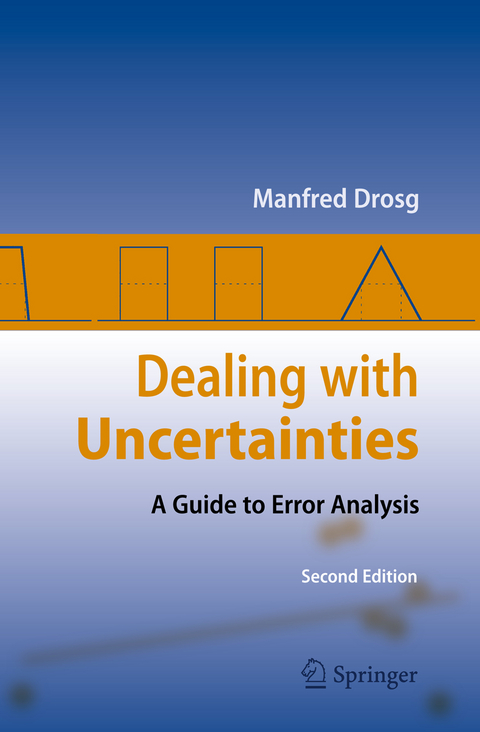
Dealing with Uncertainties
Springer Berlin (Verlag)
978-3-642-42540-0 (ISBN)
Dealing with Uncertainties is an innovative monograph that lays special emphasis on the deductive approach to uncertainties and on the shape of uncertainty distributions. This perspective has the potential for dealing with the uncertainty of a single data point and with sets of data that have different weights. It is shown that the inductive approach that is commonly used to estimate uncertainties is in fact not suitable for these two cases. The approach that is used to understand the nature of uncertainties is novel in that it is completely decoupled from measurements. Uncertainties which are the consequence of modern science provide a measure of confidence both in scientific data and in information in everyday life. Uncorrelated uncertainties and correlated uncertainties are fully covered and the weakness of using statistical weights in regression analysis is discussed. The text is abundantly illustrated with examples and includes more than 150 problems to help the reader master the subject.
Basics on Data.- Basics on Uncertainties.- Radioactive Decay,a Model for Random Events.- Frequency and Probability Distributions.- Deductive Approach to Uncertainty.- Correlation.- Dealing with Internal Uncertainties.- Presentation and Estimation of Uncertainties.- Feedback of Uncertainties on Experiment Design.
From the reviews:
"Drosg ... emphasizes that uncertainties should not always be viewed as indication of errors but, rather, be embraced by the fact that they will always exist in science and therefore are required to be addressed like any other numbers or data utilized in the study of applied mathematics or science. Drosg has vast experience in nuclear physics and electronics, as is evident from the numerous examples in his book. ... Summing Up: Recommended. Faculty; researchers; professionals." (J. T. Zerger, CHOICE, Vol. 44 (11), July, 2007)
From the reviews of the second edition:
"Graduate and undergraduate students and researchers of technical and physical sciences. This book works hard to make a distinction between 'errors' and 'uncertainties'. In most cases, the term uncertainty is indeed more appropriate and informative, but the word error has been used widely in many areas ... . The connections with statistics and probability are easy to follow and the book includes many useful exercises and their answers." (Kimmo Vehkalahti, International Statistical Review, Vol. 78 (1), 2010)
From the reviews:"Drosg … emphasizes that uncertainties should not always be viewed as indication of errors but, rather, be embraced by the fact that they will always exist in science and therefore are required to be addressed like any other numbers or data utilized in the study of applied mathematics or science. Drosg has vast experience in nuclear physics and electronics, as is evident from the numerous examples in his book. … Summing Up: Recommended. Faculty; researchers; professionals." (J. T. Zerger, CHOICE, Vol. 44 (11), July, 2007)From the reviews of the second edition:“Graduate and undergraduate students and researchers of technical and physical sciences. This book works hard to make a distinction between ‘errors’ and ‘uncertainties’. In most cases, the term uncertainty is indeed more appropriate and informative, but the word error has been used widely in many areas … . The connections with statistics and probability are easy to follow and the book includes many useful exercises and their answers.” (Kimmo Vehkalahti, International Statistical Review, Vol. 78 (1), 2010)
| Erscheint lt. Verlag | 28.11.2014 |
|---|---|
| Zusatzinfo | XIV, 235 p. |
| Verlagsort | Berlin |
| Sprache | englisch |
| Maße | 155 x 235 mm |
| Gewicht | 391 g |
| Themenwelt | Mathematik / Informatik ► Informatik ► Theorie / Studium |
| Mathematik / Informatik ► Mathematik ► Algebra | |
| Naturwissenschaften ► Physik / Astronomie ► Theoretische Physik | |
| Naturwissenschaften ► Physik / Astronomie ► Thermodynamik | |
| Schlagworte | Correlation of errors • Error Analysis • linear optimization • Random error • Statistica • Systematic error • Uncertainty considerations |
| ISBN-10 | 3-642-42540-2 / 3642425402 |
| ISBN-13 | 978-3-642-42540-0 / 9783642425400 |
| Zustand | Neuware |
| Informationen gemäß Produktsicherheitsverordnung (GPSR) | |
| Haben Sie eine Frage zum Produkt? |
aus dem Bereich


